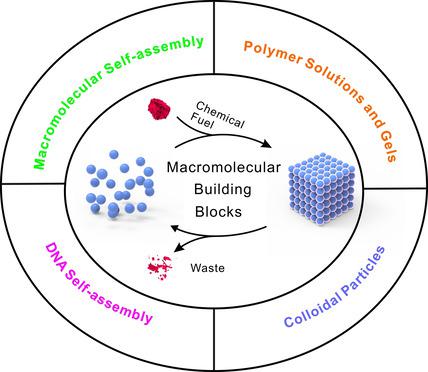当前位置:
X-MOL 学术
›
ChemPlusChem
›
论文详情
Our official English website, www.x-mol.net, welcomes your feedback! (Note: you will need to create a separate account there.)
Chemical-Fuel-Driven Assembly in Macromolecular Science: Recent Advances and Challenges.
ChemPlusChem ( IF 3.4 ) Pub Date : 2020-05-20 , DOI: 10.1002/cplu.202000192 ZeJian Leng 1 , Feng Peng 1 , Xiang Hao 1
ChemPlusChem ( IF 3.4 ) Pub Date : 2020-05-20 , DOI: 10.1002/cplu.202000192 ZeJian Leng 1 , Feng Peng 1 , Xiang Hao 1
Affiliation

|
In the past decade, chemical‐fuel‐driven processes have been integrated with synthetic self‐assembled systems, in which both the formation and properties can be carefully controlled. This strategy can drive systems far away from equilibrium, tailor the lifetime window of transient self‐assembled systems, thus holding promise for future smart, adaptive, self‐regulated, and life‐like systems. By judging whether the building blocks or transient self‐assembled systems participate in the fuel‐to‐waste conversion, the reported systems can be divided into two classes: dissipative self‐assembly and self‐assembly under dissipative conditions. Among these systems, the utilization of macromolecular building blocks to design non‐equilibrium self‐assemblied systems is becoming common. Macromolecular systems capable of dissipating energy with a programmed time domain have found widespread application, and have therefore been an active field of scientific inquiry. This Minireview aims to highlight the recent progress and opportunities of chemical‐fuel‐driven assembly in macromolecules. We envision that chemical‐fuel‐driven approach will play an increasingly important role in polymer science in the near future.
中文翻译:

高分子科学中的化学燃料驱动组装:最新进展和挑战。
在过去的十年中,化学燃料驱动的过程已与合成自组装系统集成在一起,在该系统中,可以仔细控制其形成和性质。这种策略可以使系统远离平衡状态,调整瞬态自组装系统的寿命窗口,从而为未来的智能,自适应,自调节和栩栩如生的系统带来希望。通过判断构件或瞬态自组装系统是否参与了燃料到废物的转化,可以将报告的系统分为两类:耗散自组装和耗散条件下的自组装。在这些系统中,利用高分子构件来设计非平衡自组装系统变得越来越普遍。能够以编程的时域耗散能量的大分子系统已经得到广泛应用,因此已经成为科学探究的活跃领域。本微型审查旨在强调大分子中化学燃料驱动组装的最新进展和机遇。我们设想,在不久的将来,化学燃料驱动的方法将在聚合物科学中发挥越来越重要的作用。
更新日期:2020-06-25
中文翻译:

高分子科学中的化学燃料驱动组装:最新进展和挑战。
在过去的十年中,化学燃料驱动的过程已与合成自组装系统集成在一起,在该系统中,可以仔细控制其形成和性质。这种策略可以使系统远离平衡状态,调整瞬态自组装系统的寿命窗口,从而为未来的智能,自适应,自调节和栩栩如生的系统带来希望。通过判断构件或瞬态自组装系统是否参与了燃料到废物的转化,可以将报告的系统分为两类:耗散自组装和耗散条件下的自组装。在这些系统中,利用高分子构件来设计非平衡自组装系统变得越来越普遍。能够以编程的时域耗散能量的大分子系统已经得到广泛应用,因此已经成为科学探究的活跃领域。本微型审查旨在强调大分子中化学燃料驱动组装的最新进展和机遇。我们设想,在不久的将来,化学燃料驱动的方法将在聚合物科学中发挥越来越重要的作用。



























 京公网安备 11010802027423号
京公网安备 11010802027423号